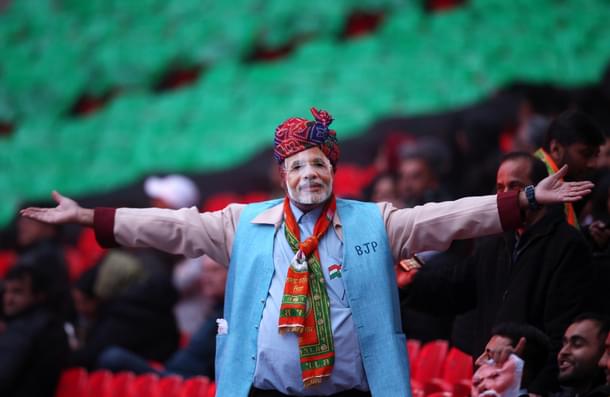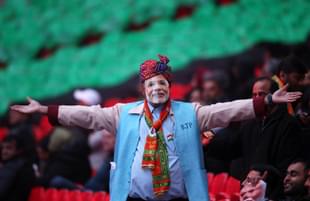Books
Confessions Of A Bhakt: Six Disappointments With The Modi Sarkar
Muthuraman
Feb 22, 2016, 04:39 PM | Updated 04:39 PM IST
Save & read from anywhere!
Bookmark stories for easy access on any device or the Swarajya app.


Narendra Modi has a massive army of online supporters who defend almost every action of this government relentlessly on Social Media against unbelievable levels of spin and distortion. A confession is in order here: This writer is one of those, who are deeply appreciative of several of the initiatives of this government.
Whether it is Jan Dhan Yojana, Mudra Bank, Life / health insurance for the common man, crop insurance for the farmers, global scale initiatives in Solar and LED or strong focus on the infrastructure sector (roads, power, smart cities), the government has made huge strides. The impact of these initiatives will be felt for several decades to come.
At the same time, six disappointments listed below haunt almost every reasonable well-wisher of Modi, and the reverberations of these are felt on the social media like a constant background noise that distracts you in a thriller movie. So it is better to get these out in the open and hope these are addressed swiftly rather than letting it bottle up!
1. Disinvestment: Modi has said many times during his campaign speech and even recently [watch 2.09 to 2.19 in recent Start-Up India speech] that the “Govt has no business to be in business”. But these words are not matched by the action on the ground. For two years in a row, the government will miss its disinvestment target by a wide margin.
More than its impact on the fiscal deficit etc., the ideological signal this move gives to the economy is tremendous (positive if done, and negative if ignored). As the saying goes, “jahan raja vyapari, wahan praja bhikari”- the worst misuse of public sector companies like Air India (which has given away plum landing slots to the private competitors) and BSNL / MTNL (which are prohibited from roaming arrangement with the private players thereby denying opportunity to capitalize on their strong rural presence) makes a strong case for divesting these companies and arresting the precious leakage of funds from the exchequer!
Modi may believe that he can turnaround the public
sector using the same bureaucrats (like Coal India) but it misses the point
of these being vulnerable to misuse by a future government. So, but for
strategic sectors (like defence and banking), government should swiftly get out
of other PSUs and focus on more pressing matters on hand.
2. Petroleum pricing: This is a strong disappointment which is having far reaching adverse impact on the image of this government as it relates to every common man on the street, unlike disinvestment discussed earlier. The constant increase in excise duty by the government, to prevent pass-through of drop in crude prices to the end consumer has resulted in a ridiculous situation where Aviation Turbine Fuel for aeroplanes cost Rs 37 per litre, while petrol costs Rs 60 per litre!
Did you know that the actual cost of producing petrol at today’s crude cost will be less than Rs 20 per litre, and the rest Rs 40 goes towards various central and state taxes? The ostensible reason for the excise hike is to minimize the fiscal deficit and also to prevent wide fluctuation in street prices, when the crude prices go up.
Neither of these reasons is strong enough to earn the wrath of the common man. First, the government should have a robust plan for fiscal deficit reduction and cannot place faith on god-sent gift of lower oil prices as a substitute. Second, given the global economic scenario, oil prices are not going up anytime soon and even when they do, the public is mature enough to relate the same (like they are relating to the mismatch now).
The government should urgently reduce Rs 10 per litre of petrol and Rs 6 litre of diesel and leave more money in the hands of the common man. The immediate effect of these on inflation and consumer confidence will kick-start the virtuous cycle of private demand growth and private CAPEX investment, the sore point of the economy today.
3. Inaction on Corrupt politicians: Modi came to power largely on the back of humungous scale of corruption – 2G, Coalgate, CWG scam etc. The public disgust with such blatant corruption converted many fence sitters to vote for Modi. And now, after two years, not even a clerk has been convicted and gone to jail on these cases! One can understand why Modi government may be reluctant to act on heavyweight politicians like Sonia or Manmohan Singh as there will be war cry of vendetta!
But why even middleweight politicos like a Koda or a Bansal or a Maran or a Raja or a Kanimozhi or Kalmadi are not yet convicted? If a Nirbhaya rape case (one among 25000 rapes that happen every year in India) can be concluded in 10 months, any of these corruption cases can be investigated on a daily basis and a few politicos and bureaucrats thrown in jail in a similar timeframe.
A related disappointment is the lack of action on black money. Either the government is not doing much on this, or not coming out with a clear communication on the key actions initiated and more importantly, the list of people nabbed and the amount recovered.
4. Tax reforms: The overall tax reforms of the Modi government is another disappointing aspect that needs urgent redressal. For instance, despite repeated assurances by Modi that honest taxpayers will not be harassed and ease of doing business will improve, the air on retrospective taxation has still not been cleared fully.
Occasional oral reassurances by the ministers are invariably followed up by ridiculous notices from over-enthusiastic (or downright treasonous) bureaucrats hurting the government’s image badly. To quote Sadanand Dhume:
If you scrap the retrospective tax law, you don’t have to repeat this pledge to investors every five minutes.
At least, the problem with the GST (Goods and Services Tax) bill can be explained away due to the lack of political capital, but increase in Service Tax from a previous rate of 12.36 per cent to current one of 14.5 per cent (and rumoured to increase further to 16 per cent in the upcoming budget) seriously hurts the common man and businesses badly.
The increase is ostensibly to
minimise the impact of the blow from the GST, but this explanation does not
wash in the absence of clear runway for the GST and in the absence of clear
communication from the government that this is being done for such reason.
Tax relief in Startup policy is another classic example of this government’s muddled tax regime. A famous Tamil saying goes like this: “Even if the god bestows a wish, the pujari doesn’t transmit it to you”.
Modi
announces to a great applause that no taxation for Startups for 3 years. Down
the line, this translates to “only for innovative startups, as certified by an
Inter-Ministerial Board yet to be formed for this purpose”! Now we all know how
inter-ministerial boards will function, given its capability to assess whether
a startup is “innovative” or not. One believes firmly that Modi has not taken
control of the tax reforms the way he has done Jan Dhan Yojana or Mudra and
this is showing!
5. Managing Media / Narrative: For a man who rode to power on the back of such a high-quality campaign management, Modi’s frequent bungling of media management and losing control of the narrative is quite frustrating for a bhakt everyday – like watching a train wreck in a slow motion! The most common ailments are:
a) Inappropriate comments by senior leaders of the party at the most inopportune time (e.g. Sadanand Gowda says “Foreign Students indulging in illegal activities” on a day when media is agog about racism in Bangalore due to a mob attack on a Tanzanian girl). He should instead be focusing on putting the state government on the mat for such poor law and order situation).
b) The poor response timing of the party leaders – whether it is ‘Church attacks’ or Dadri, front foot condemnation and strongly worded letter to CM of the state on Law & Order would have shifted burden on the CM quickly. Instead, the so-called silence of the BJP leaders (combined with the common affliction of inappropriate comments about beef at inopportune time) is made out to be a bigger crime than negligence on part of the respective state governments.
c) Feeding the beast (e.g. calling virulently anti-modi media talking heads for training government officers on media handling, giving exclusive interviews to virulently anti-Modi TV channels)
d) Illogical and undifferentiated DAVP pricing for channels (Times Now and CNN IBN get same rates of Rs 323 per 10 seconds slot, despite huge difference in viewership? One is a distant market leader while the other is a distant spin master).
e) Complete indifference to blatant misreporting by various channels and newspapers (Catch here the month-wise lies and distortions by the media), not even questioning the fig leaf of the ‘self-regulator’ on the action taken against erring channels.
6. Completely disowning the Hindu causes: This is the last, but an important disappointment for a large section of BJP supporters on Modi. Belying the stated policy of “Development for all and appeasement for none”, several actions of this government are continuing with the appeasement mode of the UPA:
a) Continued exemption of minority institutions from RTE, which is forcing thousands of schools run by Hindus to be closed down. Don’t believe me? Check here, here and here.
b) Continuing with minority-only scholarships and even enhancing the budget allocation, after Modi boldly denying such partisan religion-based scholarships as Gujarat CM and fighting it all the way up to the Supreme Court is a serious letdown.
c) Continue to watch the plunder and loot of Hindu temples by Hindu Religious & Charitable Endowment of various State Governments, while other religious places of worship are exempt from such government takeover.
In each of these, no one is grudging the
benefit to the deserved, but asking for equality of treatment. For example,
deserving students from all religions should get scholarships, all schools
should be exempt from RTE (best case) or all schools without exception should
be brought under RTE (worst case) and bring constitutional amendment to make
state control of religious places only under extraordinary circumstances (such
as fraud or theft), and strictly limited by time – say maximum of six months
under state control to set right administration and hand it over back to the
trust either under same or new management.
As a Bhakt, one will end this with the translation of a famous Tamil quote from Kamba Ramayanam:
A blind man may be disillusioned with life. But it is no match for the disillusionment of the blind, who got his eyesight once and lost it again!
Having seen Modi does his magic in Gujarat and having heard his plans for India, the disillusionment of the man on the street if he fails will be no match for the disillusionment one may have had for Manmohan Singh or even Atal Bihari Vajpayee.
Hope the course correction starts NOW!
N Muthuraman runs Riverbridge, a boutique investment banking firm. He was formerly the director of ratings at CRISIL, India’s premier ratings firm





